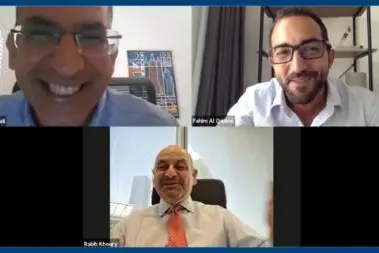PHOTO
Sharjah: The Pearl Initiative (PI), a leading Gulf business-led non-profit organisation promoting a corporate culture of accountability and transparency, held a virtual panel to discuss the significance of establishing governance frameworks in the early stages of a business’ growth and why this is advantageous in attracting investment.
Moderated by Ned Jaroudi, Start-ups and Venture Capital Lead at Amazon Web Services (AWS), the panel discussion convened experienced investors and corporate governance experts; namely, Sheikh Fahim Al Qasimi, Partner at AQ&P and Rabih I. Khoury, Managing Partner & Chief Exit Officer at Middle East Venture Partners (MEVP).
Setting context for the discussion, Jaroudi highlighted the importance of strong governance and how it is noticed by shareholders, stakeholders, employees, and customers alike, and has a strong bearing on a company’s reputation. This in turn could lead to either a higher or a lower valuation of a company and thereby playing a critical role in attracting investors and capital to the company.
Results from a poll taken during the discussion suggested that the biggest challenge faced by Gulf companies trying to establish robust governance frameworks is the lack of clarity on which policies and procedures to embed first. Understanding the ‘rules of the game’ and how to adopt them is critical when attracting investors.
Taking this conversation forward, Al Qasimi, discussed essential steps in embedding a strong framework that is easy to introduce and financially viable to execute. “Governance is not a static process and needs to continue to evolve with your business. Start by establishing a Board that is committed to steering the company in the right direction. Record keeping is another governance component that is simple and yet so effective. It showcases the operational history of your organisation and is extremely insightful for someone who might want to buy or invest in your organisation”, Al Qasimi stated.
Khoury built on this by stating, “MSMEs looking to access investment need to embrace governance wholly. Not only do you need to have a governance playbook, but you also need to ensure that it is being applied. Governance adds value, not only from a valuation perspective, but also for the sustainability of the company. If governance is applied from the beginning, then it reduces the risk of transactions and protects the company and its shareholders in the long run. MSMEs can adopt emerging governance trends as they move forward through a post-pandemic environment. There is no one-size-fits-all solution, however, the basic governance tenets are obvious.”
He continued, “From an investor’s lens, diversity should bring in multiple perspectives and complementary expertise to help young companies make some very critical growth decisions. Business digitisation and accessible technology played a critical role in not collapsing economies globally during the pandemic. Small businesses should look to utilise the online space and digitise their operations to ensure business resilience during the next crisis”.
The impact of COVID-19 stagnated business growth across the Gulf region. As businesses look to rebuild themselves, their priorities have shifted from short-term profitability to long-term business resilience. The Pearl Initiative’s Governance in MSMEs webinar series, ‘Building Better Businesses’, is targeted towards addressing the challenges and gaps in the MSME community by creating a business case for improved corporate governance.
Current programmes run by the Pearl Initiative include Anti-Corruption Best Practices, Diversity in Business Leadership, Governance in MSMEs, Governance in Family Firms, The Business Pledge, and Governance in Philanthropy.
- Ends -
About the Pearl Initiative
Business leaders from across the Gulf Region formed the Pearl Initiative in 2010 to create a non-profit organisation for the Private Sector to collectively embrace the business case in adopting higher standards in corporate governance, accountability, and transparency to enhance business innovation, opportunity, and value creation.
With over 40 regional and international partners, the Pearl Initiative brings together business, policy, and social sector decision-makers to share best practice and help maximise sustainable and inclusive growth across the region. The Pearl Initiative also supports Gulf-based university students to identify and embrace strong ethics and integrity as they embark on their future careers.
Current programmes run by the Pearl Initiative include Anti-Corruption Best Practices, Diversity in Business Leadership, Governance in MSMEs, Governance in Family Firms, The Business Pledge, and Governance in Philanthropy.
For more information, please visit www.pearlinitiative.org or contact us at enquiries@pearlinitiative.org.
© Press Release 2021
Disclaimer: The contents of this press release was provided from an external third party provider. This website is not responsible for, and does not control, such external content. This content is provided on an “as is” and “as available” basis and has not been edited in any way. Neither this website nor our affiliates guarantee the accuracy of or endorse the views or opinions expressed in this press release.
The press release is provided for informational purposes only. The content does not provide tax, legal or investment advice or opinion regarding the suitability, value or profitability of any particular security, portfolio or investment strategy. Neither this website nor our affiliates shall be liable for any errors or inaccuracies in the content, or for any actions taken by you in reliance thereon. You expressly agree that your use of the information within this article is at your sole risk.
To the fullest extent permitted by applicable law, this website, its parent company, its subsidiaries, its affiliates and the respective shareholders, directors, officers, employees, agents, advertisers, content providers and licensors will not be liable (jointly or severally) to you for any direct, indirect, consequential, special, incidental, punitive or exemplary damages, including without limitation, lost profits, lost savings and lost revenues, whether in negligence, tort, contract or any other theory of liability, even if the parties have been advised of the possibility or could have foreseen any such damages.




















